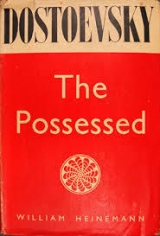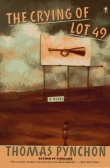
Текст книги "The Possessed"
Автор книги: Федор Достоевский
сообщить о нарушении
Текущая страница: 43 (всего у книги 49 страниц)
“Yes, there are a lot of scoundrels,” she brought out abruptly with painful effort. She lay stretched out, motionless, as though afraid to move, with her head thrown back on the pillow, rather on one side, staring at the ceiling with exhausted but glowing eyes. Her face was pale, her lips were dry and hot.
“You recognise it, Marie, you recognise it,” cried Shatov. She tried to shake her head, and suddenly the same spasm came over her again. Again she hid her face in the pillow, and again for a full minute she squeezed .Shatov's hand till it hurt. He had run up, beside himself with alarm.
“Marie, Marie! But it may be very serious, Marie!”
“Be quiet ... I won't have it, I won't have it,” she screamed almost furiously, turning her face upwards again. “Don't dare to look at me with your sympathy! Walk about the room, say something, talk. ...”
Shatov began muttering something again, like one distraught.
“What do you do here?” she asked, interrupting him with contemptuous impatience.
“I work in a merchant's office. I could get a fair amount of money even here if I cared to, Marie.”
“So much the better for you. ...”
“Oh, don't suppose I meant anything, Marie. I said it without thinking.”
“And what do you do besides? What are you preaching? You can't exist without preaching, that's your character!”
“I am preaching God, Marie.”
“In whom you don't believe yourself. I never could see the
idea of that.”
“Let's leave that, Marie; we'll talk of that later.”
“What sort of person was this Mary a Timofyevna here?”
“We'll talk of that later too, Marie.”
“Don't dare to say such things to me! Is it true that her death may have been caused by ... the wickedness ... of these people?”
“Not a doubt of it,” growled Shatov.
Marie suddenly raised her head and cried out painfully:
“Don't dare speak of that to me again, don't dare to, never,
never!”
And she fell back in bed again, overcome by the same convulsive agony; it was the third time, but this time her groans were louder, in fact she screamed.
“Oh, you insufferable man! Oh, you unbearable man,” she cried, tossing about recklessly, and pushing away Shatov as he bent over her.
“Marie, I'll do anything you like .... I'll walk about and talk. . . .”
“Surely you must see that it has begun!”
“What's begun, Marie?”
“How can I tell! Do I know anything about it? . . . I curse myself! Oh, curse it all from the beginning!”
“Marie, if you'd tell me what's beginning ... or else I ... if you don't, what am I to make of it?”
“You are a useless, theoretical babbler. Oh, curse everything on earth!”
“Marie, Marie!” He seriously thought that she was beginning to go mad.
“Surely you must see that I am in the agonies of childbirth,” she said, sitting up and gazing at him with a terrible, hysterical vindictiveness that distorted her whole face. “I curse him before he is born, this child!”
“Marie,” cried Shatov, realising at last what it meant. “Marie . . . but why didn't you tell me before.” He pulled himself together at once and seized his cap with an air of vigorous determination.
“How could I tell when I came in here? Should I have come to you if I'd known? I was told it would be another ten days! Where are you going? . . . Where are you going? You mustn't dare!”
“To fetch a midwife! I'll sell the revolver. We must get money before anything else now.”
“Don't dare to do anything, don't dare to fetch a midwife! Bring a peasant woman, any old woman, I've eighty kopecks in my purse. . . . Peasant women have babies without midwives. . . . And if I die, so much the better. ...”
“You shall have a midwife and an old woman too. But how am I to leave you alone, Marie!”
But reflecting that it was better to leave her alone now in spite of her desperate state than to leave her without help later, he paid no attention to her groans, nor her angry exclamations, but rushed downstairs, hurrying all he could.
III
First of all he went to Kirillov. It was by now about one o'clock in the night. Kirillov was standing in the middle of the room.
“Kirillov, my wife is in childbirth.”
“How do you mean?”
“Childbirth, bearing a child!”
“You . . . are not mistaken?”
“Oh, no, no, she is in agonies! I want a woman, any old woman, I must have one at once. . . . Can you get one now? You used to have a lot of old women. . . .”
“Very sorry that I am no good at childbearing,” Kirillov answered thoughtfully; “that is, not at childbearing, but at doing anything for childbearing ... or ... no, I don't know how to say it.”
“You mean you can't assist at a confinement yourself? But that's not what I've come for. An old woman, I want a woman, a nurse, a servant!”
“You shall have an old woman, but not directly, perhaps ... If you like I'll come instead. ...”
“Oh, impossible; I am running to Madame Virginsky, the midwife, now.”
“A horrid woman!”
“Oh, yes, Kirillov, yes, but she is the best of them all. Yes, it'll all be without reverence, without gladness, with contempt, with abuse, with blasphemy in the presence of so great a mystery, the coming of a new creature! Oh, she is cursing it already!”
“If you like I'll . . .”
“No, no, but while I'm running (oh, I'll make Madame Virginsky come), will you go to the foot of my staircase and quietly listen? But don't venture to go in, you'll frighten her; don't go in on any account, you must only listen ... in case anything dreadful happens. If anything very bad happens, then run in.”
“I understand. I've another rouble. Here it is. I meant to have a fowl to-morrow, but now I don't want to, make haste, run with all your might. There's a samovar all the night.”
Kirillov knew nothing of 'the present design against Shatov, nor had he had any idea in the past of the degree of danger that threatened him. He only knew that Shatov had some old soores with “those people,” and although he was to some extent involved with them himself through instructions he had received from abroad (not that these were of much consequence, however, for he had never taken any direct share in anything), yet of late he had given it all up, having left off doing anything especially for the “cause,” and devoted himself entirely to a life of contemplation. Although Pyotr Stepanovitch had at the meeting invited Liputin to go with him to Kirillov's to make sure that the latter would take upon himself, at a given moment, the responsibility for the “Shatov business,” yet in his interview with Kirillov he had said no word about Shatov nor alluded to him in any way – probably considering it impolitic to do so, and thinking that Kirillov could not be relied upon. He put off speaking about it till next day, when it would be all over and would therefore not matter to Kirillov; such at least was Pyotr Stepanovitch's judgment of him. Liputin, too, was struck by the fact that Shatov was not mentioned in spite of what Pyotr Stepanovitch had promised, but he was too much agitated to protest.
Shatov ran like a hurricane to Virginsky's house, cursing the distance and feeling it endless.
He had to knock a long time at Virginsky's; every one had been asleep a long while. But Shatov did not scruple to bang at the shutters with all his might. The dog chained up in the yard dashed about barking furiously. The dogs caught it up all along the street, and there was a regular babel of barking.
“Why are you knocking and what do you want?” Shatov heard at the window at last Virginsky's gentle voice, betraying none of the resentment appropriate to the “outrage.” The shutter was pushed back a little and the casement was opened.
“Who's there, what scoundrel is it?” shrilled a female voice which betrayed all the resentment appropriate to the “outrage.” It was the old maid, Virginsky's relation.
“I am Shatov, my wife has come back to me and she is just confined. ...”
“Well, let her be, get along.”
“I've come for Arina Prohorovna; I won't go without Arina Prohorovna!”
“She can't attend to every one. Practice at night is a special line. Take yourself off to Maksheyev's and don't dare to make that din,” rattled the exasperated female voice. He could hear Virginsky checking her; but the old maid pushed him away and would not desist.
“I am not going away!” Shatov cried again.
“Wait a little, wait a little,” Virginsky cried at last, overpowering the lady. “I beg you to wait five minutes, Shatov. I'll wake Arina Prohorovna. Please don't knock and don't shout. . . . Oh, how awful it all is!”
After five endless minutes, Arina Prohorovna made her appearance.
“Has your wife come?” Shatov heard her voice at the window, . and to his surprise it was not at all ill-tempered, only as usual peremptory, but Arina Prohorovna could not speak except in a peremptory tone.
“Yes, my wife, and she is in labour.”
“Marya Ignatyevna?”
“Yes, Marya Ignatyevna. Of course it's Marya Ignatyevna.”
A silence followed. Shatov waited. He heard a whispering in the house.
“Has she been here long?” Madame Virginsky asked again.
“She came this evening at eight o'clock. Please make haste.”
Again he heard whispering, as though they were consulting. “Listen, you are not making a mistake? Did she send you for me herself?”
“No, she didn't send for you, she wants a peasant woman, so as not to burden me with expense, but don't be afraid, I'll pay you.”
“Very good, I'll come, whether you pay or not. I always thought highly of Marya Ignatyevna for the independence of her sentiments, though perhaps she won't remember me. Have you got the most necessary things?”
“I've nothing, but I'll get everything, everything.”
“There is something generous even in these people,” Shatov reflected, as he set off to Lyamshin's. “The convictions and the man are two very different things, very likely I've been very unfair to them! . . . We are all to blame, we are all to blame . . . and if only all were convinced of it!”
He had not to knock long at Lyamshin's; the latter, to Shatov's surprise, opened his casement at once, jumping out of bed, barefoot and in his night-clothes at the risk of catching cold; and he was hypochondriacal and always anxious about his health. But there was a special cause for such alertness and haste: Lyamshin had been in a tremor all the evening, and had not been able to sleep for excitement after the meeting of the quintet; he was haunted by the dread of uninvited and undesired visitors. The news of Shatov's giving information tormented him more than anything. . . . And suddenly there was this terrible loud knocking at the window as though to justify his fears.
He was so frightened at seeing Shatov that he at once slammed the casement and jumped back into bed. Shatov began furiously knocking and shouting.
“How dare you knock like that in the middle of the night?” shouted Lyamshin, in a threatening voice, though he was numb with fear, when at least two minutes later he ventured to open the casement again, and was at last convinced that Shatov had come alone.
“Here's your revolver for you; take it back, give me fifteen roubles.”
“What's the matter, are you drunk? This is outrageous, I shall simply catch cold. Wait a minute, I'll just throw my rug over me.”
“Give me fifteen roubles at once. If you don't give it me, I'll knock and shout till daybreak; I'll break your window-frame.”
“And I'll shout police and you'll be taken to the lock-up.”
“And am I dumb? Can't I shout 'police' too? Which of us has most reason to be afraid of the police, you or I?”
“And you can hold such contemptible opinions! I know what you are hinting at. ... Stop, stop, for God's sake don't go on knocking! Upon my word, who has money at night? What do you want money for, unless you are drunk?”
“My wife has come back. I've taken ten roubles off the price, I haven't fired it once; take the revolver, take it this minute!”
Lyamshin mechanically put his hand out of the casement and took the revolver; he waited a little, and suddenly thrusting his head out of the casement, and with a shiver running down his spine, faltered as though he were beside himself.
“You are lying, your wife hasn't come back to you. . . . It's . . . it's simply that you want to run away.”
“You are a fool. Where should I run to? It's for your Pyotr Verhovensky to run away, not for me. I've just been to the midwife, Madame Virginsky, and she consented at once to come to me. You can ask them. My wife is in agony; I need the money; give it me!”
A swarm of ideas flared up in Lyamshin's crafty mind like a shower of fireworks. It all suddenly took a different colour, though still panic prevented him from reflecting.
“But how . . . you are not living with your wife?”
“I'll break your skull for questions like that.”
“Oh dear, I understand, forgive me, I was struck all of a heap. . . . But I understand, I understand ... is Arina Prohorovna really coming? You said just now that she had gone? You know, that's not true. You see, you see, you see what lies you tell at every step.”
“By now, she must be with my wife . . . don't keep me . . . it's not my fault you are a fool.”
“That's a lie, I am not a fool. Excuse me, I really can't ...”
And utterly distraught he began shutting the casement again for the third time, but Shatov gave such a yell that he put his head out again.
“But this is simply an unprovoked assault! What do you want of me, what is it, what is it, formulate it? And think, only think, it's the middle of the night!”
“I want fifteen roubles, you sheep's-head!”
“But perhaps I don't care to take back the revolver. You have no right to force me. You bought the thing and the matter is settled, and you've no right. ... I can't give you a sum like that in the night, anyhow. Where am I to get a sum like that?”
“You always have money. I've taken ten roubles off the price, but every one knows you are a skinflint.”
“Come the day after to-morrow, do you hear, the day after to-morrow at twelve o'clock, and I'll give you the whole of it, that will do, won't it?”
Shatov knocked furiously at the window-frame for the third time.
“Give me ten roubles, and to-morrow early the other five.”
“No, the day after to-morrow the other five, to-morrow I swear I shan't have it. You'd better not come, you'd better not come.”
“Give me ten, you scoundrel!”
“Why are you so abusive. Wait a minute, I must light a candle; you've broken the window. . . . Nobody swears like that at night. Here you are!” He held a note to him out of the window.
Shatov seized it – it was a note for five roubles.
“On my honour I can't do more, if you were to murder me, I couldn't; the day after to-morrow I can give you it all, but now I can do nothing.”
“I am not going away!” roared Shatov.
“Very well, take it, here's some more, see, here's some more, and I won't give more. You can shout at the top of your voice, but I won't give more, I won't, whatever happens, I won't, I won't.”
He was in a perfect frenzy, desperate and perspiring. The two notes he had just given him were each for a rouble. Shatov had seven roubles altogether now.
“Well, damn you, then, I'll come to-morrow. I'll thrash you, Lyamshin, if you don't give me the other eight.”
“You won't find me at home, you fool!” Lyamshin reflected quickly.
“Stay, stay!” he shouted frantically after Shatov, who was already running off. “Stay, come back. Tell me please, is it true what you said that your wife has come back?”
“Fool!” cried Shatov, with a gesture of disgust, and ran home as hard as he could.
IV
I may mention that Anna Prohorovna knew nothing of the resolutions that had been taken at the meeting the day before. On returning home overwhelmed and exhausted, Virginsky had not ventured to tell her of the decision that had been taken, yet he could not refrain from telling her half – that is, all that Verhovensky had told them of the certainty of Shatov's intention to betray them; but he added at the same time that he did not quite believe it. Arina Prohorovna was terribly alarmed. This was why she decided at once to go when Shatov came to fetch her, though she was tired out, as she had been hard at work at a confinement ah! the night before. She had always been convinced that “a wretched creature like Shatov was capable of any political baseness,” but the arrival of Marya Ignatyevna put things in a different light. Shatov's alarm, the despairing tone of his entreaties, the way he begged for help, clearly showed a complete change of feeling in the traitor: a man who was ready to betray himself merely for the sake of ruining others would, she thought, have had a different air and tone. In short, Arina Prohorovna resolved to look into the matter for herself, with her own eyes.* Virginsky was very glad of her decision, he felt as though a hundredweight had been lifted off him! He even began to feel hopeful: Shatov's appearance seemed to him utterly incompatible with Verhovensky's supposition.
Shatov was not mistaken: on getting home he found Arina Prohorovna already with Marie. She had just arrived, had contemptuously dismissed Kirillov, whom she found hanging about the foot of the stairs, had hastily introduced herself to Marie, who had not recognised her as her former acquaintance, found her in “a very bad way,” that is ill-tempered, irritable and in “a state of cowardly despair,” and within five minutes had completely silenced all her protests.
“Why do you keep on that you don't want an expensive midwife?” she was saying at the moment when Shatov came in. “That's perfect nonsense, it's a false idea arising from the abnormality of your condition. In the hands of some ordinary old woman, some peasant midwife, you'd have fifty chances of going wrong and then you'd have more bother and expense than with a regular midwife. How do you know I am an expensive midwife? You can pay afterwards; I won't charge you much and I answer for my success; you won't die in my hands, I've seen worse cases than yours. And I can send the baby to a foundling asylum to-morrow, if you like, and then to be brought up in the country, and that's all it will mean. And meantime you'll grow strong again, take up some rational work, and in a very short time you'll repay Shatov for sheltering you and for the expense, which will not be so great.”
“It's not that . . . I've no right to be a burden. . . .”
“Rational feelings and worthy of a citizen, but you can take my word for it, Shatov will spend scarcely anything, if he is willing to become ever so little a man of sound ideas instead of the fantastic person he is. He has only not to do anything stupid, not to raise an alarm, not to run about the town with his tongue out. If we don't restrain him he will be knocking up all the doctors of the town before the morning; he waked all the dogs in my street. There's no need of doctors I've said already. I'll answer for everything. You can hire an old woman if you like to wait on you, that won't cost much. Though he too can do something besides the silly things he's been doing. He's got hands and feet, he can run to the chemist's without offending your feelings by being too benevolent. As though it were a case of benevolence! Hasn't he brought you into this position? Didn't he make you break with the family in which you were a governess, with the egoistic object of marrying you? We heard of it, you know . . . though he did run for me like one possessed and yell so all the street could hear. I won't force myself upon anyone and have come only for your sake, on the principle that all of us are bound to hold together! And I told him so before I left the house. If you think I am in the way, good-bye, I only hope you won't have trouble which might so easily be averted.”
And she positively got up from the chair. Marie was so helpless, in such pain, and – the truth must be confessed – so frightened of what was before her that she dared not let her go. But this woman was suddenly hateful to her, what she said was not what she wanted, there was something quite different in Marie's soul. Yet the prediction that she might possibly die in the hands of an inexperienced peasant woman overcame her aversion. But she made up for it by being more exacting and more ruthless than ever with Shatov. She ended by forbidding him not only to look at her but even to stand facing her. Her pains became more violent. Her curses, her abuse became more and more frantic.
“Ech, we'll send him away,” Arina Prohorovna rapped out. “I don't know what he looks like, he is simply frightening you; he is as white as a corpse! What is it to you, tell me please, you absurd fellow? What a farce!”
Shatov made no reply, he made up his mind to say nothing. “I've seen many a foolish father, half crazy in such cases. But they, at any rate ...”
“Be quiet or leave me to die! Don't say another word! I won't have it, I won't have it!” screamed Marie.
“It's impossible not to say another word, if you are not out of your mind, as Ithink you are in your condition. We must talk of what we want, anyway: tell me, have you anything ready? You answer, Shatov, she is incapable.”
“Tell me what's needed?”
“That means you've nothing ready.” She reckoned up all that was quite necessary, and one must do her the justice to say she only asked for what was absolutely indispensable, the barest necessaries. Some things Shatov had. Marie took out her key and held it out to him, for him to look in her bag. As his hands shook he was longer than he should have been opening the unfamiliar lock. Marie flew into a rage, but when Arina Prohorovna rushed up to take the key from him, she would not allow her on any account to look into her bag and with peevish cries and tears insisted that no one should open the bag but Shatov.
Some things he had to fetch from Kirillov's. No sooner had Shatov turned to go for them than she began frantically calling him back and was only quieted when Shatov had rushed impetuously back from the stairs, and explained that he should only be gone a minute to fetch something indispensable and would be back at once.
“Well, my lady, it's hard to please you,” laughed Arina Prohorovna, “one minute he must stand with his face to the wall and not dare to look at you, and the next he mustn't be gone for a minute, or you begin crying. He may begin to imagine something. Come, come, don't be silly, don't blubber, I was laughing, you know.”
“He won't dare to imagine anything.”
“Tut, tut, tut, if he didn't love you like a sheep he wouldn't run about the streets with his tongue out and wouldn't have roused all the dogs in the town. He broke my window-frame.”
He found Kirillov still pacing up and down his room so preoccupied that he had forgotten the arrival of Shatov's wife, and heard what he said without understanding him.
“Oh, yes!” he recollected suddenly, as though tearing himself with an effort and only for an instant from some absorbing idea, “yes ... an old woman. ... A wife or an old woman? Stay a minute: a wife and an old woman, is that it? I remember. I've been, the old woman will come, only not just now. Take the pillow. Is there anything else? Yes. . . . Stay, do you have moments of the eternal harmony, Shatov?”
“You know, Kirillov, you mustn't go on staying up every night.”
Kirillov came out of his reverie and, strange to say, spoke far more coherently than he usually did; it was clear that he had formulated it long ago and perhaps written it down.
“There are seconds – they come five or six at a time – when you suddenly feel the presence of the eternal harmony perfectly attained. It's something not earthly – I don't mean in the sense that it's heavenly – but in that sense that man cannot endure it in his earthly aspect. He must be physically changed or die. This feeling is clear and unmistakable; it's as though you apprehend all nature and suddenly say, 'Yes, that's right.' God, when He created the world, said at the end of each day of creation, 'Yes, it's right, it's good.' It ... it's not being deeply moved, but simply joy. You don't forgive anything because there is no more need of forgiveness. It's not that you love – oh, there's something in it higher than love – what's most awful is that it's terribly clear and such joy. If it lasted more than five seconds, the soul could not endure it and must perish. In those five seconds I live through a lifetime, and I'd give my whole life for them, because they are worth it. To endure ten seconds one must be physically changed. I think man ought to give up having children – what's the use of children, what's the use of evolution when the goal has been attained? In the gospel it is written that there will be no child-bearing in the resurrection, but that men will be like the angels of the Lord. That's a hint. Is your wife bearing a child?”
“Kirillov, does this often happen?”
“Once in three days, or once a week.”
“Don't you have fits, perhaps?”
“No.”
“Well, you will. Be careful, Kirillov. I've heard that's just how fits begin. An epileptic described exactly that sensation before a fit, word for word as you've done. He mentioned five seconds, too, and said that more could not be endured. Remember Mahomet's pitcher from which no drop of water was spilt while he circled Paradise on his horse. That was a case of five seconds too; that's too much like your eternal harmony, and Mahomet was an epileptic. Be careful, Kirillov, it's. epilepsy!”
“It won't have time,” Kirillov smiled gently.
VI
The night was passing. Shatov was sent hither and thither, abused, called back. Marie was reduced to the most abject terror for life. She screamed that she wanted to live, that “she must, she must,” and was afraid to die. “I don't want to, I don't want to!” she repeated. If Arina Prohorovna had not been there, things would have gone very badly. By degrees she gained complete control of the patient – who began to obey every word, every order from her like a child. Arina Prohorovna ruled by sternness not by kindness, but she was first-rate at her work. It began to get light . . . Arina Prohorovna suddenly imagined that Shatov had just run out on to the stairs to say his prayers and began laughing. Marie laughed too, spitefully, malignantly, as though such laughter relieved her. At last they drove Shatov away altogether. A damp, cold morning dawned. He pressed his face to the wall in the corner just as he had done the evening before when Erkel came. He was trembling like a leaf, afraid to think, but his mind caught at every thought as it does in dreams.
He was continually being carried away by day-dreams, which snapped off short like a rotten thread. From the room came no longer groans but awful animal cries, unendurable, incredible. He tried to stop up his ears, but could not, and he fell on his knees, repeating unconsciously, “Marie, Marie!” Then suddenly he heard a cry, a new cry, which made Shatov start and jump up from his knees, the cry of a baby, a weak discordant cry. He crossed himself and rushed into the room. Arina Prohorovna held in her hands a little red wrinkled creature, screaming, and moving its little arms and legs, fearfully helpless, and looking as though it could be blown away by a puff of wind, but screaming and seeming to assert its full right to live. Marie was lying as though insensible, but a minute later she opened her eyes, and bent a strange, strange look on Shatov: it was something quite new, that look. What it meant exactly he was not able to understand yet, but he had never known such a look on her face before.
“Is it a boy? Is it a boy?” she asked Arina Prohorovna in an exhausted voice.
“It is a boy,” the latter shouted in reply, as she bound up the child.
When she had bound him up and was about to lay him across the bed between the two pillows, she gave him to Shatov for a minute to hold. Marie signed to him on the sly as though afraid of Arina Prohorovna. He understood at once and brought the baby to show her.
“How . . . pretty he is,” she whispered weakly with a smile.
“Poo, what does he look like,” Arina Prohorovna laughed gaily in triumph, glancing at Shatov's face. “What a funny face!”
“You may be merry, Arina Prohorovna. . . . It's a great joy,” Shatov faltered with an expression of idiotic bliss, radiant at the phrase Marie had uttered about the child.
“Where does the great joy come in?” said Arina Prohorovna good-humouredly, bustling about, clearing up, and working like a convict.
“The mysterious coming of a new creature, a great and inexplicable mystery; and what a pity it is, Arina Prohorovna, that you don't understand it.”
Shatov spoke in an incoherent, stupefied and ecstatic way. Something seemed to be tottering in his head and welling up from his soul apart from his own will.
“There were two and now there's a third human being, a new spirit, finished and complete, unlike the handiwork of man; a new thought and a new love . . . it's positively frightening. . . . And there's nothing grander in the world.”
“Ech, what nonsense he talks! It's simply a further development of the organism, and there's nothing else in it, no mystery,” said Arina Prohorovna with genuine and good-humoured laughter. “If you talk like that, every fly is a mystery. But I tell you what: superfluous people ought not to be born. We must first remould everything so that they won't be superfluous and then bring them into the world. As it is, we shall have to take him to the Foundling, the day after to-morrow. . . . Though that's as it should be.”
“I will never let him go to the Foundling,” Shatov pronounced resolutely, staring at the floor.
“You adopt him as your son?”
“He is my son.”
“Of course he is a Shatov, legally he is a Shatov, and there's no need for you to pose as a humanitarian. Men can't get on without fine words. There, there, it's all right, but look here, my friends,” she added, having finished clearing up at last, “it's time for me to go. I'll come again this morning, and again in the evening if necessary, but now, since everything has gone off so well, I must run off to my other patients, they've been expecting me long ago. I believe you got an old woman somewhere, Shatov; an old woman is all very well, but don't you, her tender husband, desert her; sit beside her, you may be of use; Marya Ignatyevna won't drive you away, I fancy. . . . There, there, I was only laughing.”








